The Minimalists
Joshua Fields Millburn and Ryan Nicodemus are the “Minimalists”. They are two guys that have published books, posted you tube videos and pod casts and made a documentary on the benefits of minimalism. The Minimalists have travelled the United States speaking to everyone and anyone who will listen to their message that you don’t need a lot to be happy; you only need to have the things that matter. You may have seen their documentary “Minimalism” on Netflix, listened to their pod cast or read their books and essays. In a few short years they have helped start a quiet movement in the United States and the rest of the world on the benefits of minimalism.
Take a look around you. What do you see? In my house I see a lot of clutter. Having a couple of kids who are teenagers and twenty years of accumulated possessions does that. It’s actually quite normal to have a house full of things that we barely use or need. Our society expects it and we have been bought up to believe the mantra of marketing and consumerism; “more is better”. Take a walk through a shopping mall or a furniture and electrical goods warehouse and we are immediately impressed by the range of goods on offer. They promise a more comfortable existence and the marketing used tries to convince us that we will be happier, more popular and attractive if we fill our lives with more.
Less is More
The Minimalists would argue that the opposite is true. More is not necessarily better and in fact it may be what’s holding us back. Having less is having more. The counter-paradigm is a hard concept to accept. How can having less be better than having more? How can living in a small house or apartment that is sparsely furnished be better than living in a luxury mansion or apartment full of elegant and expensive furniture? Why would someone choose to ride a bicycle to work when they can drive their comfortable BMW? Isn’t it better to have a walk in wardrobe full of clothes and shoes to choose from than a small selection of functional yet attractive garments and shoes? Who wants to work in a job that provides for our needs rather than our endless wants? You want us to work to live, rather than live to work? Life is not about money? Are these Minimalists mad?
In the documentary “Minimalism: A documentary about the important things” we learn that Millburn was working in a higher powered corporate role and was chasing the American Dream. On the rat race to the top, Millburn found that he was working crazy hours and stretching himself thin. Relationships with people were shallow and geared towards personal gain. Life was about owning more and getting as far up the ladder as possible, at any cost. This is the competitive culture that society instils in people.
Take a walk down the main street of your commercial capital and you will hear the hum of capitalism and the fast pace of people defying reality by trying to push infinite growth in a finite system. Something has to give and for Millburn it did. The loss of his mother and marriage in the same month and nearly burned out by his job, Millburn was chronically unhappy with his life. Depressed and questioning everything he lived for he stumbled on minimalism and his life changed for forever. Minimalism and simplicity set him free.
Slow Death
I recently learned that in Japan the rate of deaths of otherwise young and healthy professionals from overwork and stress is unprecedented. China is fast catching up as its fast growing economy and hard work ethic churns people through the system and spits them out. Hundreds of millions of people in that country are desperately trying to achieve the same level of affluence and fulfil the same material goals that hold us hostage in the west. The eastern culture of community, simplicity and harmony has been hijacked by consumerism and unsustainable economic growth.
In the west many of us are forced to work longer and harder for less as prices increase and wages freeze. We spend our lives chasing the dollar to fill our homes with worthless junk or in some cases to continue to live with the basics and make ends meet. People are becoming more insular and disconnected from each other as they focus on their own lives and “keeping up with the Joneses”. Society is becoming more dysfunctional and unhappy as people mindlessly ride the Hedonistic merry-go round. We seek and then finding grow bored and dissatisfied and we seek the next thing to fulfil us. Never happy, never satisfied.
The Environment is suffering from our over consumption and waste. We stand on the brink of ecological collapse. Insanity is the only word to describe the paradigm we live in. It can only end one way, but it doesn’t have to.
Love People not Things
Millburn says in his documentary that we should “Love people and use things, because the opposite never works.” As a 12 Step Jedi I can identify. In active alcoholism we use people purely for the purpose of getting drunk. Alcohol is not so much used by us as it uses us. It sounds insane but the disease of alcoholism is completely insane. We are prepared to sacrifice everything in order to satisfy an addiction that is slowly killing us physically, emotionally and spiritually. A love affair with booze forms that resembles the most dysfunctional and destructive of relationships yet nothing short of death or a spiritual experience will break that bond.
I had a spiritual experience, no doubt about it. Perhaps Millburn did to. No two spiritual experiences are the same. The bright white light and “out of body” experience described in the literature is rare. Most people experience a type of epiphany or a sudden self realisation. A number of discoveries are made and events occur in almost fortuitous succession that lead of personal insight and spiritual breakthroughs.
I hit rock bottom and was presented with the truth of what I had become and given a clear vision of who I truly am. Perhaps Millburn experienced something similar. The 12 Steps and the Jedi Path is my road and minimalism was his. The end result is that we got the same basic truth to always “love people and use things”.
Clean Minds
Everyone thinks that minimalism is about getting rid of stuff that we have been hording for years. Going through the garage, wardrobe, basement and attic and turfing things out is only part of it. We also have to take a look at the mental junk that we are hording in our minds and decide what to discard and what to hold on to.
That is essentially what Millburn did when he quit his job and sold his stuff, he was overhauling the mental paradigm he was trapped in. By changing his external world and his behaviours he was changing his internal world. As he started to free himself of the clutter and false ideas of the world he began to realize a better and easier way to live, minimalism. The changes in his life resulted in changes to his own mental patterns and ultimately his character. The wonderful thing about the Minimalists is that they could also take this and share it with the world and support themselves by doing it.
So what can we take from the Minimalists and how can we apply it in our own lives? Those that practice a philosophy for life will have many answers. I know that the 12 Steps and the Jedi Path lead us to a minimalist life through deeds, not words. To be Jedi is to take action:
Take Action
- Take Stock: Millburn quit his job not because he hated his boss but because he saw that his life was passing him by in the mindless pursuit of wealth and material possessions. Millburn recalibrated his values and decided he wanted to live a life worth remembering. A major part of that was realizing that money is not everything. Yes, we need money and it can make life more pleasurable but poor people are happy too. We need to decide what we value in life and live in accordance with our values.
- De-clutter: In the army they used to say something along the lines that “if your shit is not squared away neither is your head”, except the language was far more colourful. It is true that a cluttered home or workspace denotes a cluttered mind. By applying the 5S principles we can de-clutter and organise our external world and allow the benefits to flow in to other areas of our lives.
- Service: One of the best ways of getting out of our own heads is by helping others. It is no cliché, doing something for others, even small acts of kindness make us appreciate people more and thereby forget our own troubles. We come to realize that helping others provides us greater rewards than money can.
- Mental Breaks: Meditation, mindfulness and awareness are tool we can use to reduce the mental clutters and ease the chattering mind monkeys that assault us sometimes constantly.
- Less is better: I find I am addicted to social media and the news. Taking a break from both is a respite. We are tied to our phones and our internet accounts. Some people never put them down. The other day I heard a line which I thought rang very true “Years ago we used the internet to escape from reality, these days we escape the internet by returning to reality”. Our over consumption extends to television and food as well. We need to eat less junk and more healthier food, exercise more and spend more time outdoors in nature and with other people instead of staring at a box.
And most importantly, remember: “love people, not things.”
Books by The Minimalists:
Everything That Remains: A Memoir by The Minimalists
Minimalism: Live a Meaningful Life


